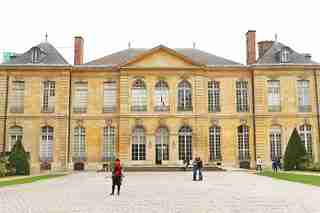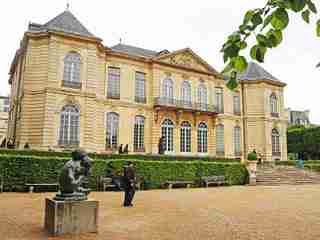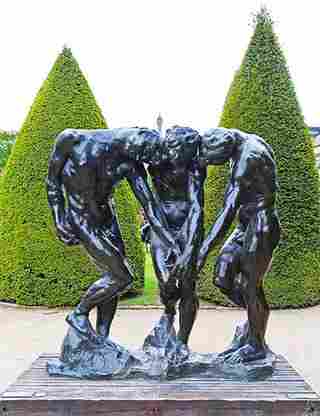
dam-images-daily-2015-03-tae-musee-rodin-tae-musee-rodin-garden-01.jpg
Built in the early 18th-century by a wealthy financier, the grand Paris home that now houses Musée Rodin had many high-profile occupants over the years, including dukes, cardinals, nuns, ambassadors, and, at the turn of the 20th century, artists, among them Jean Cocteau, Isadora Duncan, Henri Matisse, and Auguste Rodin. The French government bought the property in 1911 but allowed Rodin until his death in 1917.

dam-images-daily-2015-03-tae-musee-rodin-tae-musee-rodin-garden-02.jpg
The raised terrace at the rear of Hôtel Biron offers views of the Musée Rodin’s axial-laid garden.

dam-images-daily-2015-03-tae-musee-rodin-tae-musee-rodin-garden-05.jpg
Another view of Art of Pleasure and Knowledge.
dam-images-daily-2015-03-tae-musee-rodin-tae-musee-rodin-garden-04.jpg
Rodin’s Art of Pleasure and Knowledge is ringed with cone-shaped boxwoods. The layout encourages visitors to circle around the work of art.
dam-images-daily-2015-03-tae-musee-rodin-tae-musee-rodin-garden-03.jpg
Matching planters frame the entrance to the garden from the Hôtel Biron.
dam-images-daily-2015-03-tae-musee-rodin-tae-musee-rodin-garden-06.jpg
A reflecting pool, colonnade, and glimpse of the city beyond create a unique backdrop for The Burghers of Calais.
dam-images-daily-2015-03-tae-musee-rodin-tae-musee-rodin-garden-07.jpg
The Gates of Hell, based on Dante’s Divine Comedy, is located at the end of the walled garden. Rather than closing off the space, it hints at another beyond.
dam-images-daily-2015-03-tae-musee-rodin-tae-musee-rodin-garden-10.jpg
A circular pool serves as axis for the formal gardens.
dam-images-daily-2015-03-tae-musee-rodin-tae-musee-rodin-garden-08.jpg
A view of the garden from the Hôtel Biron’s rear terrace.
dam-images-daily-2015-03-tae-musee-rodin-tae-musee-rodin-garden-09.jpg
Spring plantings starting to bloom.
dam-images-daily-2015-03-tae-musee-rodin-tae-musee-rodin-garden-12.jpg
The formal landscape design complements the architecture of the Hôtel Biron.
dam-images-daily-2015-03-tae-musee-rodin-tae-musee-rodin-garden-11.jpg
A glance back at the Hôtel Biron.
dam-images-daily-2015-03-tae-musee-rodin-tae-musee-rodin-garden-15.jpg
An allée underplanted with a low hedge leads to the garden’s central fountain.
dam-images-daily-2015-03-tae-musee-rodin-tae-musee-rodin-garden-17.jpg
Monument to Victor Hugo .
dam-images-daily-2015-03-tae-musee-rodin-tae-musee-rodin-garden-14.jpg
The less formal section of the garden seems to burst with new growth in spring.
dam-images-daily-2015-03-tae-musee-rodin-tae-musee-rodin-garden-13.jpg
The colonnade-shaped hedge has a gentle curve to echo the garden’s circular central fountain.
dam-images-daily-2015-03-tae-musee-rodin-tae-musee-rodin-garden-16.jpg
Rodin immersed himself in the works of his subjects: While sculpting Monument to Balzac, he became obsessed with the author, poring over his writings for seven years while he worked on the statue, framed here in a side garden.
dam-images-daily-2015-03-tae-musee-rodin-tae-musee-rodin-garden-18.jpg
Marble works by Rodin are set within a building constructed of masonry and glass. They are protected from the elements but feel at one with the garden.
dam-images-daily-2015-03-tae-musee-rodin-tae-musee-rodin-garden-19.jpg
Another view of the marble works.
dam-images-daily-2015-03-tae-musee-rodin-tae-musee-rodin-garden-20.jpg
Rodin was an ardent gardener. “The artist is the confidant of nature,” he wrote. “Flowers carry on dialogues with him through the graceful bending of their stems and the harmoniously tinted nuances of their blossoms. Every flower has a cordial word which nature directs toward him.” Here, an early bloom at the Musée Rodin.
dam-images-daily-2015-03-tae-musee-rodin-tae-musee-rodin-garden-21.jpg
The Thinker, viewed from behind.
dam-images-daily-2015-03-tae-musee-rodin-tae-musee-rodin-garden-22.jpg
Detail of The Thinker.
